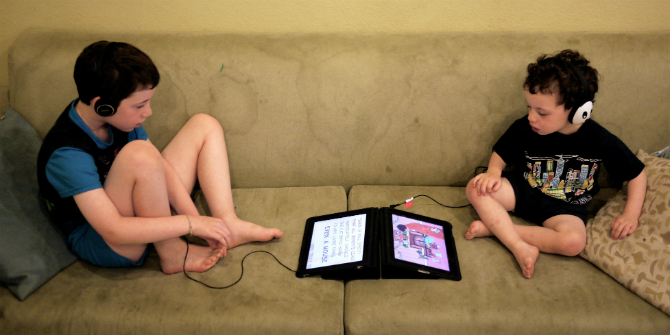 Credit: P. Cuhalev, CC BY-NC 2.0
Credit: P. Cuhalev, CC BY-NC 2.0
 Guest contributor Christopher J. Ferguson looks at research on video games, the problems around thin evidence and the grand claims it oftentimes makes. He examines what studies of children and gaming actually say – and here’s his list of take-home messages for parents. Christopher is an associate professor of psychology at Stetson University in DeLand, Florida. He has written numerous peer-reviewed articles related to media effects on children’s behaviours and has also written a novel, Suicide Kings. He lives in Orlando, FL with his wife and son.
Guest contributor Christopher J. Ferguson looks at research on video games, the problems around thin evidence and the grand claims it oftentimes makes. He examines what studies of children and gaming actually say – and here’s his list of take-home messages for parents. Christopher is an associate professor of psychology at Stetson University in DeLand, Florida. He has written numerous peer-reviewed articles related to media effects on children’s behaviours and has also written a novel, Suicide Kings. He lives in Orlando, FL with his wife and son.
Debate regarding the impact of video games on youth who play them has been going on now for three decades. Slowly, signs seem to emerge that our society is accepting games as a normal part of life. More and more women as well as men are gaming. The Smithsonian Institute acknowledged that games are art. In 2011 The US Supreme Court acknowledged that research couldn’t link violent games to a public health crisis. Even the US House of Representatives acknowledged the same in the midst of the furor following the 2012 Sandy Hook shooting (although it turned out the shooter was more interested in non-violent games like Dance, Dance, Revolution). Nonetheless, disagreement, often inter-generational, still continues. Certainly, not everyone agrees on this issue and, as I wrote about in a previous column, intense controversy continues at the level of professional guild organizations such as the American Psychological Association.
One of the problems with the scholarship on video games is that much of it is done with college students, not children or adolescents. Many of these college students participants are taught media effects theories in their classes, then scholars use these students in experiments like the ones the students just learned about. Eager for extra credit, college students may be able to guess study hypotheses and do what they think their professors want them to do, rather than what they’d actually do. Nonetheless, studies with college students are often generalized to youth, and used to try to inform public policy. But what do studies of children actually say?
To answer this I recently published a meta-analysis in the journal Perspectives on Psychological Science (see also a reply to some comments here). A meta-analysis statistically synthesizes existing studies to give us some sense of what the research field looks like overall. In this case I examined 101 studies using children and adolescents (not college students) including over 100k youth. I wanted to see how much evidence there was that video games, including violent games, contributed to problems ranging from aggression, to reduced prosocial behavior, depression, attention problems and academic problems.
It turns out that, despite some of the hyperbole by anti-game activists, the evidence is thin. Particularly when other factors are controlled, there is little evidence that games, whether violent or not, are related to negative outcomes in youth.
There were also clear problems with the literature. Publication bias (the tendency for journals to selectively publish statistically significant findings) remains somewhat a problem particularly for aggression studies (probably not surprising since that’s where most of the hoopla is). Further, there were significant issues with citation bias… scholars only citing studies that support their personal views and ignoring studies that didn’t. Scholars who engaged in such behaviors were more likely to find evidence for video game effects than scholars who provided balanced reviews. This provides evidence for researcher expectancy effects… that researchers may be reporting results that indicate what they expected or wanted to find rather than what actually happens in real life. Often this happens in good faith. Given how flexible social science research is (not in a good way), it’s easy for a good-faith researcher to convince herself or himself that unexpected results must have been in error and keep rerunning statistics different ways until expected results are achieved.
Sometimes people ask me how they can tell when someone is trying to be objective when talking about the research on video games since opinions vary so widely. In fairness, I think it’s possible for someone to make an honest and objective argument both for the possibility that video games may have some negative effects, as well as to conversely argue that video games do not have such negative effects. See, for example, a polite debate I had with Dr. Elly Konijn at VU University Amsterdam, where I think valid points are made for both perspectives. One thing to look for is that “citation bias”… the tendency for scholars to acknowledge only studies that agree with their views. If you hear a scholar claim “The research studies consistently and clearly demonstrate X” you can pretty much stop listening. The research field is a mess and this person is either uninformed or doesn’t want you to know about evidence conflicting with his or her personal views. So what’s the take-home message for parents?
- First, there’s a lot of bad information out there. No, video games are not as addictive as heroin. No, they do not play a role in mass murders. No, their effects as not remotely as powerful as smoking on lung cancer. No, the military doesn’t use them to desensitize soldiers to kill. Be wary of extreme claims, either of harm or, for that matter, of benefits.
- When you ask experts for their opinion on games, you’ll get wildly varying answers. The answers will probably reflect their age, experience with games, and if they already don’t like kids very much. Among both clinicians and researchers age and hostility toward youth are predictive of negative game attitudes.
- No one knows your child better than you do. If you’re thinking about introducing games with higher age ratings, do so in an informed manner (see below). Set clear behavioral or grade contingencies, play along with your child or teen, or even on your own to see what’s in the game. Talk with your child in advance about what needs to work in order for him or her to keep playing the game. And, by all means, if things don’t seem to be working, take a step back. Most research looks across all kids, but each child is different. What works for one child or even most children, may not be what’s right for your family. Of course this goes for lots of things. Games aren’t unique in this manner.
- Your decisions about your child’s video games are not likely to be amongst the most crucial you will make in your parenting career. I’m not saying they’re not important at all, but they’re well south of “should I vaccinate?” (yes, you should) or “should I spend more time at work or with my kids” (kids, for sure, although we could all be better about this). Point being: it’s ok to relax a bit.
- Be informed. Know the ESRB rating system. Play games with your children. Read game reviews. Talk to your kids about the games they like to play (yes I know the 1000th conversation about Minecraft becomes tedious. If you wanted something that didn’t play video games you should have gotten a cat.)
- Respect the decisions of other parents. What is right for one child or one family is not what will work for another. This is trickiest when children from different families with different rules play together. Talk to the other parents and find compromise that works for everyone. Either way, refer back to No. 3. Your kids are socializing with other kids (and yes, video games are a social activity, that’s the important thing). That’s more important than any game the kids do or do not play, so work together as parents to ensure they can still play together.
- I’m going to make one bold prediction and that is that in 30 years people will look back and think this whole thing was dumb. Like The-Senate-holds-hearings-on-Cyndi Lauper-and-Twisted-Sister dumb. Or comic-books-cause-homosexuality dumb. Or Harry-Potter-turns-our-children-into-witches dumb. We’ve burned decades trying to link video games to school violence, mass murder, asteroids striking the earth and just about everything else. I sincerely believe that such needless attention did real damage to our ability to focus on other issues that influence violence, whether poverty, mental health, educational disparities or understanding effective community policing. And that is the real tragedy of the three-decade moral panic over video games.
NOTES
This text was originally published on the Huffington Post Blog and has been re-posted with permission.





